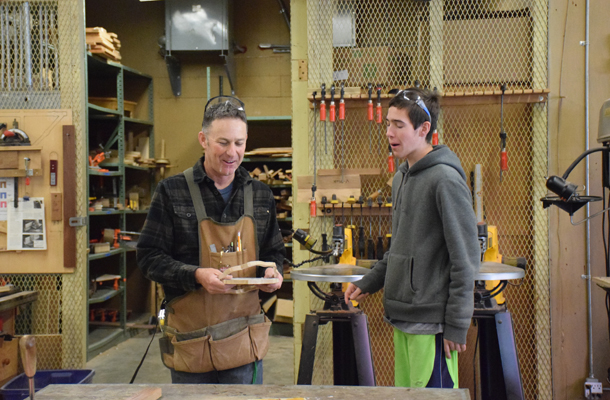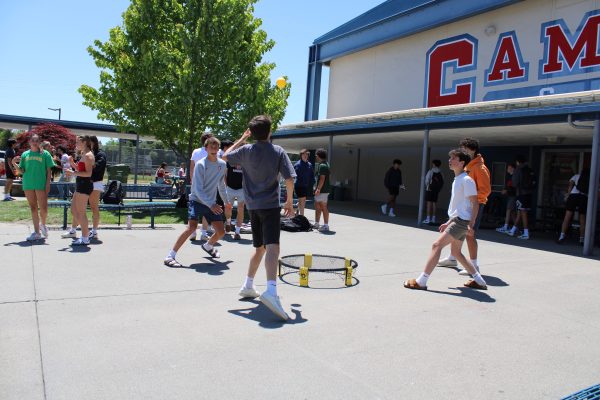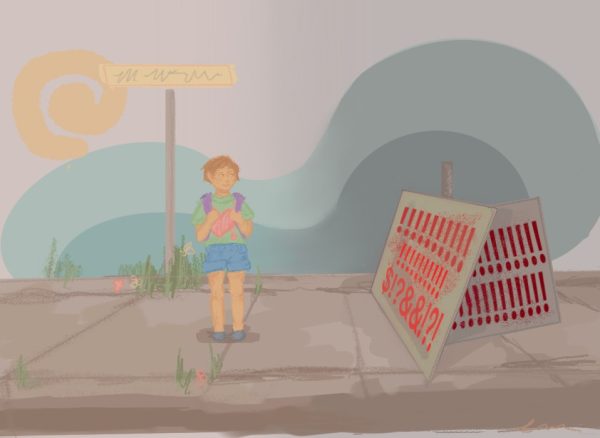Wood Tech Future Uncertain
March 27, 2018
Students in the Wood Technology program were told by their instructor on March 6 that the program would likely not be offered next year. The likely discontinuation of wood tech follows a trend that began last year with the retirement of the Furniture and Design course. Technical education classes across the district are somewhat of an endangered species.
Little information has been made available by the administration, who were unable to comment due to the uncertainty of the ongoing decision process.
According to Wood Tech teacher Barry Weiss, ending a more than 25-year-long tradition with w
oodworking will be a “loss to campus.” Weiss currently teaches the beginning and advanced courses, as well as Fabrication and Design at Acalanes.
Students, like sophomore Bennett Silverman, are hopeful the course will survive. “I know some students talked to their counselors [about pushing to continue the course],” he said. Silverman has an appreciation for the independence and perseverance the course instilled in him.
News of the program’s possible cancellation came as a shock to students. “We didn’t know anything about it. Then pretty much the last 5 minutes of class he [Weiss] told everyone, like ‘Hey, be quiet’ and ‘Unless you guys talk to your counselors I’m gonna be laid off and there’s not gonna be a wood shop program next year,” said Silverman.
“I asked ‘Is the program gonna run next year, is there gonna be a class?’ And I was told by administration ‘I don’t know.’ So, students have gone down to talk to counselors and administration and they’ve been told the same answer: ‘I don’t know.'” said Weiss, adding that the department head of Vocational Education, Steven Boone, was given the same answer.
Weiss said that the administration suggested that the issue has to do with “numbers.” In other words, there may not be enough students interested in the course.
Weiss, however, believes there are plenty of students who would take the course. “This year I had 3 full classes. And I know that a lot of kids signed up, and there’s a lot of incoming 9th graders that have signed up. And so unless the district has other plans for this [wood shop] room, they haven’t told us,” said Weiss.
However, sophomore Metehan Teker said that “the wood shop program has kind of been declining ever since Mr. DuPont left, in terms of enrollment,” adding that there was a lot of “hype” to enroll in the class in the past, yet “a lot of people ended up dropping out.” Teker has also witnessed this decline with the discontinuing of the Furniture and Design course this year, and also cited the change in teaching style from DuPont to Weiss, as the latter’s classes are more “work-intensive.”
According to the Acalanes Unified High School District (AUHSD) course catalog, Wood Technology is a class that enables students to safely and effectively operate and maintain hand and power tools and woodworking machines. The course, writes the catalog, entails a series of “several projects” designed to teach literacy with “tools and woods” and “basic joinery and finishing techniques” with an emphasis on “safety, responsibility, and cooperation.”
The curriculum includes the United States Customary Units System, use of saws and drills, knowledge of species of woods and types of paints and varnishes, and the ability to work independently on a sustained project. Fulfilling the 1-year visual art credit requirement and counting towards 10-course credits, Wood Tech is a low-stress, high activity course where one’s grade is earned throu
gh independence and creativity.
Recently, Silverman participated in a wood reclamation project through the course. “We made recycled wood birdhouses that took wood from like old fences,” said Silverman, explaining that the project entailed a synthesis of wood with “old license plates and old scrap metal.”
“It’s called the ‘rustic birdhouse project,’ where it’s all made out of recycled materials. Old fence boards and reclaimed random parts and stuff like that,” explained Weiss, citing that this form of project-based learning teaches students about reuse and recycling through relevant and applicable green technology.
While technical education may not ultimately be the path for some students, the skills these trade courses provide are ones some university-bound students believe can help them outside of the shop.
“Everybody needs to know how things get put together…The skills that you learn in here are gonna help you further down the road,” said Weiss.
Other skills that the program builds are less tangible. “I think the lessons I learned from woodshop will help me in my career and further education after high school,” said Silverman, who spoke specifically of the “perseverance” that Wood Tech has cultivated.
“It takes a lot of effort to stick with it [a project] and not give up. And it can be hard sometimes. I’ve messed up a lot of projects. I’ve crushed them against the floor or something like that but I [ultimately] stuck with it [the project],” said Silverman, adding that he doesn’t “really know” other courses whose projects “last as long as in woodshop” and equally instill sustained self-direction and focus.
Weiss urges students “if they feel really strongly about this program that students– and their parents are all taxpayers and stakeholders at this school –that it’s up to them. They need to go talk to administration, talk to the counselors and say that we want to keep this c
lass, we want to keep this program,” he said. “Obviously, I’m out of a job, but I really like working here, and it’s just the best bunch of students and a great bunch of teachers [at Campo],” said Weiss.





